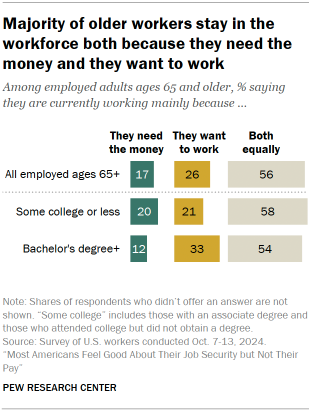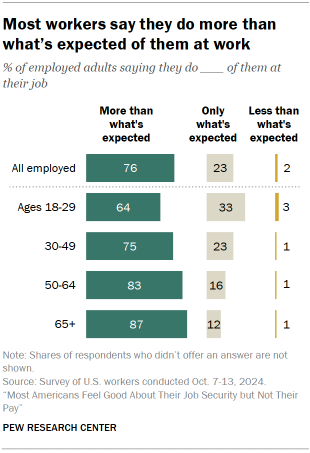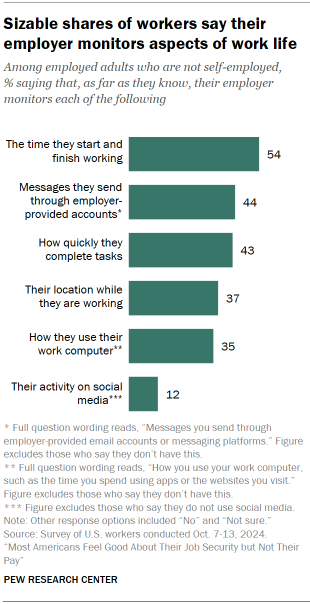When we asked workers how they see their job, half say they consider their current job as a career, while 15% say it is a stepping stone to a career. About a third (35%) say it’s just a job to get them by.
Young workers are less likely than older workers to see their jobs as a career. Some 28% of workers ages 18 to 29 say this, while about half or more of those in older age groups say the same. Still, a majority of young workers say their job is either a career or a stepping stone.
Workers’ attitudes about their job also differ by education. Most of those with a postgraduate degree (75%) view their job as a career, compared with 59% of those with a bachelor’s degree only, 44% of those with some college education, and 35% of those with a high school diploma or less education. About half of workers with a high school diploma or less (51%) say their job is just something to get them by.
There is a moderate gender difference on this question. More than half of men (54%) consider their job a career, compared with 46% of women.
How older workers see their jobs
Workers ages 65 and older are the most likely age group to say their job is just something to get them by. Half say this is the case, compared with about four-in-ten or fewer in younger age groups.

To further explore older workers’ views, we asked those ages 65 and older why they are currently working.
The majority (56%) say they work both because they need the money and because they want to work.
Another 26% say they work mainly because they want to, while 17% say it’s mainly because they need the money.
Older workers’ reasons for working vary by education. Those with at least a bachelor’s degree are more likely than those with some college or less education to say they work mainly because they want to (33% vs. 21%). In turn, older workers with some college or less education are more likely than those with at least a bachelor’s degree to say they work mainly because they need the money (20% vs. 12%).
Meeting expectations at work

Most workers (76%) say they do more than what’s expected of them at their job. Some 23% say they do only what’s expected, while 2% say they do less than what’s expected of them.
Older workers are more likely than younger workers to say they do more than what’s expected of them. The vast majority of workers ages 50 and older (84%) say this, compared with 75% of workers ages 30 to 49, and 64% of workers 18 to 29.
In turn, workers ages 18 to 29 are the most likely to say they do only what’s expected of them (33%) when compared with all older groups.
For the most part, there are no significant differences by gender or education.
Are workers being monitored – and how do they feel about it?
More than half (54%) of workers who are not self-employed say their employer monitors the time they start and finish working. About a third or more also say their employer monitors:

- Messages they send through employer-provided email accounts or messaging platforms (44%)
- How quickly they complete their tasks (43%)
- Their location while they are working (37%)
- How they use their work computer, such as the time they spend using apps or the websites they visit (35%)
A much smaller share (12%) says their employer monitors their activity on social media.
The shares of workers who say they are monitored by their employer vary widely by workers’ educational attainment. For example, workers with some college or less education are more likely than those with at least a bachelor’s degree to say that their employer monitors the time they start and finish working (64% vs. 40%), how quickly they complete tasks (48% vs. 34%), and their location while working (41% vs. 32%).
For the most part, workers feel the amount of monitoring from their employer is appropriate: 69% say they think their employer monitors what they are doing about the right amount.
Some 12% think their employer monitors them too closely, while 6% say their employer doesn’t monitor them closely enough; 13% aren’t sure.
Perhaps unsurprisingly, workers who say their employer monitors each of the activities listed above are more likely than those who say their employer is not tracking them to think their employer monitors them too closely. Those who say their employer monitors their social media use are especially likely to say they are tracked too closely (28% hold this view, compared with 20% or fewer among those who say their employer monitors other aspects of their work).
Still, even among those who say their employer monitors them, majorities describe it as the right amount.




